December 2006
Monthly Archive
Sun 31 Dec 2006
What follows arose from an inquiry by Paul Di Filippo on the FictionMags Yahoo group, based on a mystery novel found in a recent catalog from Peter Stern —
— Another Lesser-Known Writer in the crime field, one C. B. Dignam, commands top-dollar ($300) for his/her 1926 novel BLACK VELVET.
I am unable to google anything on Dignam. Anyone know info about this forgotten writer?
● Another member of the group, Denny Lien, a librarian at the University of Minnesota came up with the following information —
— Hubin lists only this and one other detective novel by the author, does not expand the pseudonyms or give dates etc., so presumably unknown and perhaps pseudonymous..
No holdings for the book in WorldCat. COPAC shows it at the British Library and the National Library of Scotland:
Main Author: Dignam, C. B.
Title Details: Black Velvet. A novel.
Publisher: London : John Hamilton, [1926.]
Physical desc.: pp. 287. ; 8o.
Note: Part of “The Sundial Mystery Library.”
and gives the same holdings for his/her only other novel:
Main Author: Dignam, C. B.
Title Details: The Sons of Seven.
Publisher: London : John Hamilton, 1928.
Physical desc.: pp. 357. ; 8o.
Note: Part of “The Sundial Mystery Library.”
I assume the “Sundial Mystery Library” was likely a lending library specialist or some such, resulting in few surviving copies.
● I sent both query and response to Al Hubin, who had this to add —
— I once owned copies of both Dignam’s books, but have no further information. According to freebmd.org, Dignam was a fairly common British surname, so it could be an author’s real name. But that list has no one with the initials C. B., though it’s possible that one of the listed persons with a first name beginning with C had a middle name which wasn’t given (or that one of a few entries without first/middle names and just given as “male” or “female” could be our author). I’ll inquire of others in case they know anything about C. B.
● But at the moment, this is where the matter stands. From their titles, both books sound like “thrillers” to me. I cannot think of very many female mystery writers who felt the need to disguise their sex by using initials or a “male-sounding” pseudonym, so my feeling is that C. B. Dignam was male.
And yet, Mary Violet Heberden, to point out a single counterexample (and all I need is one), and for whatever reason, felt the need to write her more than thirty spy/private eye novels in the 1940s and 50s as either M. V. Heberden or Charles L. Leonard. (The link will lead you to my review of Sinister Shelter, which Heberden wrote under the latter name, a private eye novel which has Paul Kilgerrin doing some post-war work in South America for the US government.)
In any case, here is another question: How many other female mystery writers can you think of who have disguised themselves in print as male? Leave a comment, if you would, or email me directly.
And FYI: There are currently three copies of BLACK VELVET for sale on the Internet, ranging in price from $14.00 to $53.50, including postage.
Sat 30 Dec 2006
Posted by Steve under
Authors ,
CoversNo Comments
Following up on the previous post, here’s an email that Bill Crider just sent me, along with a scan of the missing cover:
Hey, Steve.
Haven’t read this in over 25 years. All I remember is that it’s about a bag man for the mob and that I didn’t think it was in the same league with the Mandrell books.
Best,
Bill
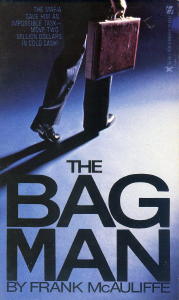
Thanks, Bill. I knew that someone must have a copy kicking around. Why am I not surprised that it was you?
The image is a little too dark to make out the text in the upper right corner. Here’s what it says:
THE MAFIA GAVE HIM AN IMPOSSIBLE TASK — MOVE TWO MILLION DOLLARS IN COLD CASH!
— Unfortunately another impossible task for the rest of us is to find a copy of our own, unless it’s one of the ones that PointBlank will be doing. Eventually, perhaps?
Fri 29 Dec 2006
Always worthy of your attention is Peter Rozovsky’s Detectives Without Borders blog. In a recent posting, Peter compares and contrasts super-spy Peter O’Donnell’s Modesty Blaise with Frank McAuliffe’s super-hitman Augustus Mandrell. His primary thesis is that both characters came about as differing reactions to Ian Fleming’s super-successful James Bond, but that all three of these caper/spy heroes are essentially products of pure wish fulfillment.
Peter goes on to say more, including some conjectures about what a romantic interlude between Modesty Blaise and Augustus Mandrell might be like, but the wish fulfillment part is as right as the bank. One wonders, though, or at least I always have, why Frank McAuliffe’s books were never as successful as those of other two authors. In recent years the Mandrell books have become a cult favorite among those who happen to have copies of them, and sad to say, they are not always easy to find. Here’s a complete listing of McAuliffe’s novels and story collections, excerpted from Al Hubin’s Crime Fiction IV:
McAULIFFE, FRANK (Malachi) (1926-1986)
Of All the Bloody Cheek. Ballantine 1965, story collection. [Augustus Mandrell]
“The Dr. Sherrock Commission” ss
“The General LaCorte Commission” nv
“The Iranian Farmer Commission” nv
“The Scotland Yard Commission” nv
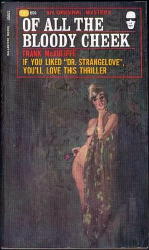
Rather a Vicious Gentleman. Ballantine 1968, story collection. [Augustus Mandrell]
“The American Mistress Commission” nv
“The Bullrusher Commission” nv
“The Irish Monster Commission” nv
“The Sealed Tomb Commission” nv
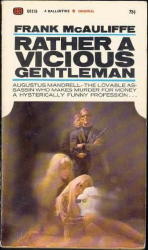
For Murder I Charge More. Ballantine 1971, story collection. [Augustus Mandrell]
“The American Apple Pie Commission” nv
“The Baseball Commission” nv
“The German Tourist Commission” nv
“The Hawaiian Volcano Commission” nv
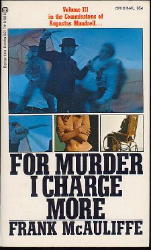
The Bag Man. Zebra 1979
As Frank Malachy:
Hot Town (Permabooks, 1956)
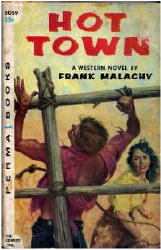
A superb overview of the Mandrell stories can be found here, where Robert Wilfred Franson suggests that they should be read in order to get the full benefit from them. (Something I haven’t double-checked yet is whether all of the stories were original in the books or not. Nothing that I have found so far suggests that they aren’t, but there may be something I’ve missed.)
I don’t know anything about The Bag Man, and if you do, maybe you can help me out about it. In fact, I don’t believe I’ve ever even seen a copy of one. Trying to find one just a moment ago using www.bookfinder.com, not a single one turned up offered for sale.
Hot Town was published when McAuliffe was only 30, and in fact what it is, is a western novel. Since it is listed in CFIV, what it apparently is, is a western with strong criminous underpinnings. It also is fairly scarce, with only 5 or 6 showing up for sale, but this one I do happen to have a copy of. (And I did not know that it was written by McAuliffe until about maybe a minute and a half ago.) [UPDATE:01-01-07. Based on a comment left by Bob Franson, Al Hubin has decided to delete Hot Town from CFIV.]
The good news is that PointBlank is going to be reprinting some if not all of McAuliffe’s books. Allow me to quote from their website:
FRANK McAULIFFE (1926-1986) is the author of five previously published books. Of All The Bloody Cheek, Rather A Vicious Gentleman, For Murder I Charge More (the first three in the Augustus Mandrell series), Hot Town, and The Bag Man. Prompted by rumors of an unpublished fourth Mandrell novel, acclaimed mystery writers, Walter Satterthwait and Bill Crider contacted the author’s wife, Rita. (Incidently, her birth date, February 13th, is the one Augustus Mandrell perpetually refers to as “…that birth date, historically, of beautiful women…”) Through an uncanny chain of fortuitous events the manuscript was found, and will be published by PointBlank.
Frank McAuliffe was born the eldest of eight children to Irish immigrants, Con and Margaret McAuliffe in New York City, New York. He married Rita Gibbons and they had seven children together (Meg, Liz, Mark, Mary, Kate, Barbara, and Luke). After moving to Ventura, California, McAuliffe worked as a technical writer for the Navy, but spent most of his spare time writing fiction. In 1972 Frank McAuliffe was awarded the Edgar Allan Poe Award for his novel, For Murder I Charge More. Upon accepting the award for The Best Paperback Mystery of the Year, McAuliffe responded, “Ladies and Gentlemen, you have impeccably good taste.”
— The reason for the long delay in getting the fourth adventure of Augustus Mandrell published? McAuliffe submitted the manuscript of They Shoot Presidents, Don’t They? to his publisher just prior to death of President Kennedy, and the book was cancelled.
Thu 28 Dec 2006
Posted by Steve under
InquiriesNo Comments
I received the following inquiry yesterday by email:
Dear Steve,
You are doing a terrific job. Thank you very much.
There are a couple of books/stories I want to know about:
1) I read a book by Erle Stanley Gardner about 25 years ago havi ng a character by the name of Terry Clane. I have not been able to locate that book nor any other with the character. In the book, Terry Clane uses a Chinese meditation technique to solve problems. Can you help me?
2) Has Alfred Hitchcock himself written any mysteries?
Keep up the good work.
— Shashi Dharan
Dear Shashi

Thank you for your kind words about Mystery*File. The original site has been on hiatus since September, and (*fanfare*) this is the first posting in its new format.
If you haven’t visited it yet, another site I have been spending some time on is www.crimefictioniv.com. I hope you’ll take a look when you have a chance.
To answer your questions, the two books by Erle Stanley Gardner in which Terry Clane appeared are Murder Up My Sleeve (1937), and The Case of the Backward Mule (1946). Both can be easily obtained, I’m sure, from the usual sources on the Internet (www.biblio.com, ABE, Amazon, and so on).
I wasn’t previously aware of Terry Clane’s Chinese meditation techique in solving crimes, so I looked him up on Google, where I found a link to Murder Up My Sleeve in The George Kelley Paperback Collection. You’ll find him described there as: Clane, formerly a lawyer and currently a “mysterious adventurer,” has recently returned from an extended stay in China where he studied at a Chinese monastery and collected a large number of Chinese curios, including a sleeve gun. The book came out in 1937, so I imagine that The Shadow got to China before Terry Clane did.

If you’re interested, you can find an extremely complete bibliography for Gardner at http://www.grooviespad.com/esg/works/Bibliography.asp
The only book attributed to Alfred Hitchcock personally is Rope (Dell, paperback, mapback edition, 1948), a novelization of his movie of the same name, but it was actually ghost-written by Don Ward. I strongly doubt that Hitchcock had much involvement with the various anthologies produced under his byline, and probably never with Alfred Hitchcock’s Mystery Magazine.
For a partial list of the anthologies, a sales list at http://www.alfredsplace.com/mysterybooks.htm provides cover images and the contributors for each.
I hope this helps!
Steve




